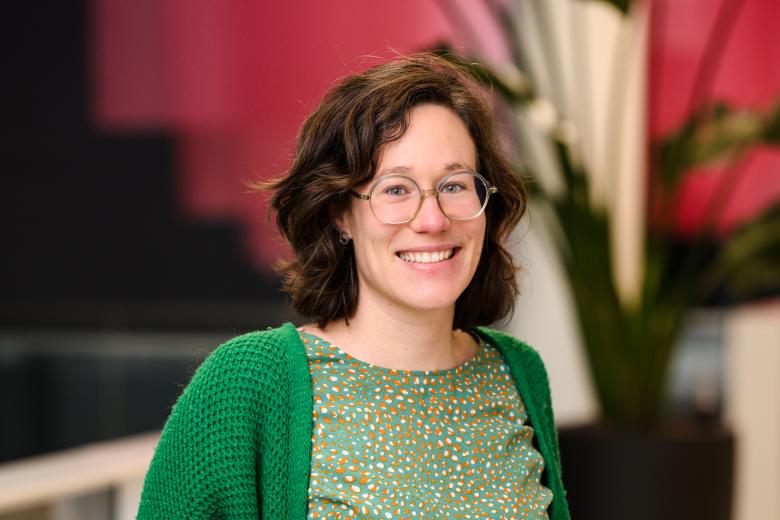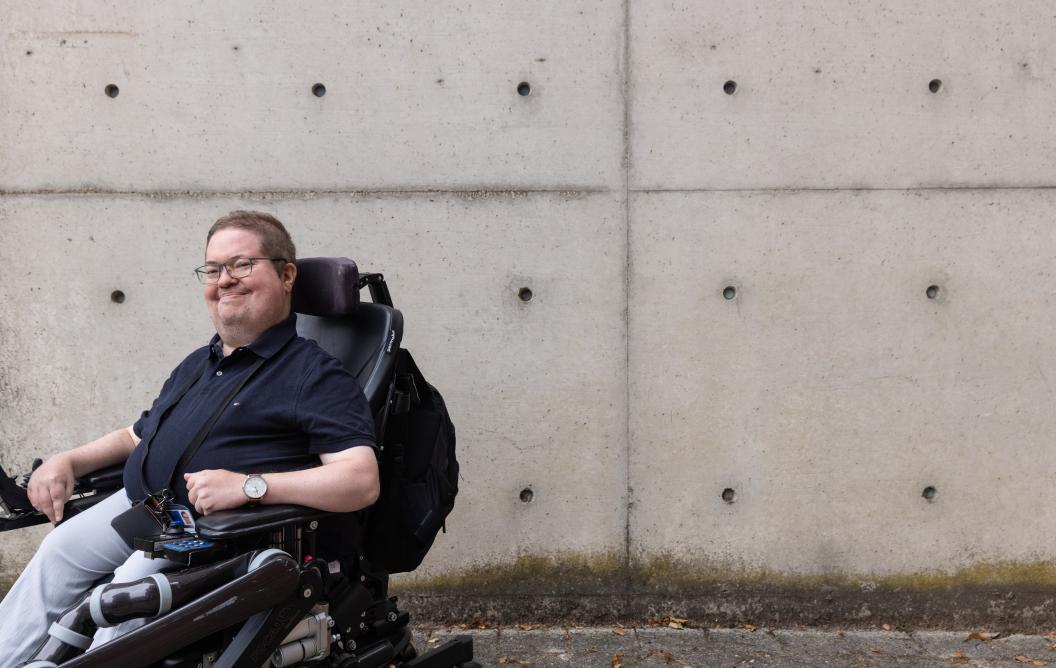“I think in terms of solutions”
That Stephan Smeekes became a professor of econometrics at the age of 41 is not to say this path is open to anyone with a disability. “Everybody’s different, and so is every disability,” he says. He doesn’t see himself as an ambassador for disabled academics. “But if my story inspires others, that’s a good thing, for sure.” A down-to-earth researcher and devoted teacher, Smeekes learnt from his parents never to give up and to think in terms of solutions.
Faced with a group of sleepy, poorly prepared students for an 8.30 tutorial, Stephan Smeekes sometimes wonders: is this what I got up at 5.30 for? “But I never say so, because it’s not their fault I need three hours in the morning. And then if I do manage to wake them up and inspire them, it’s all the more satisfying.”
Smeekes lives independently in a flat in the Maastricht city centre, where he can call day and night for assistance from Fokus, a healthcare organisation. “It’s nice to be able to be alone sometimes, and to have the freedom to decide for myself how to organise my day. When I travel in the Netherlands or go to conferences abroad, my parents always come with me. They’ve seen a lot of Europe that way. And at work, there are always colleagues who are willing and able to help me.”
Mindset
Questions arose about Smeekes’ health soon after his birth. It turned out to be a progressive muscle disease called SMA. “I was never able to walk, and went to primary school in an electric wheelchair. A normal primary school and then a normal secondary school; that was important to my parents. From the beginning, they tried to give me and my younger sister as normal a life as possible. They always thought pragmatically, in terms of solutions rather than problems.” His father worked in logistics and IT, his mother quit her job to care for him. The mindset he inherited was at least as valuable as the physical support. He learnt to accept life as it is and not to dwell on the impossible, but to put his energy into things he could influence.
He had a scare two years ago, when his right arm suddenly stopped working in just a few days. “It’s hard because you don’t know where it will stop. Since then, I haven’t been able to pick up a cup to drink from, so I had to find a solution. Now I have a robotic arm attached to my wheelchair. There’s no point in moping.” He loves watching sports on TV, so this Olympic summer he was all set. He has never grieved over not being able to play sports himself. “That might actually make it easier to accept. I can just enjoy it. Like the Maastricht football club MVV; I’ve been a season ticket holder my whole life. I go to practically every home game with my dad and friends.”
Referee
At school, not being able to take part in gym was no problem. “I usually just went along; often I’d be the referee. I was never bullied. There were always children who were happy to help me put my coat on and things like that.” It soon became clear that he was a quick learner, and during high school his affinity for maths and economics came to the fore. Econometrics seemed a logical choice of study programme. As did UM, conveniently located in his hometown. His parents didn’t go to university themselves, so an academic career wasn’t self-evident. “But it became clear to me that the more abstract and theoretical the issues were, the more interesting I found them.” He graduated cum laude, which paved the way to a PhD position.
Text continues below the photo.
Royal lunch
He describes his field of expertise as ‘just a complicated type of puzzle’. “Solving problems by understanding complex theories, or mathematically proving why certain statistical properties are the way they are—that’s what gives me the most satisfaction.” His PhD project went smoothly, for the most part. “It was a really good experience. Which is not to say it’s always easy; there are periods where you make barely any progress, but I just accepted that as something that’s part and parcel of it. It never bothered me.”
His dissertation was awarded the Christiaan Huygens Prize, a KNAW prize awarded to young researchers who make an innovative contribution to science. “And that earnt me an invitation to lunch with the king. Well, he was crowned a few weeks later. There were about 25 other prize winners there, and he had to admit that he struggled to understand what my research was about. Actually, that’s a pretty standard reaction; you get used to it. This kind of research is too abstract for the general public to understand, which makes it less broadly appealing. But that’s fine with me.”
Making an impact
At its core, his research revolves around uncovering connections in large amounts of data collected over time. Smeekes develops mathematically underpinned algorithms that can be applied to economic principles such as inflation and—most interestingly to the researcher—topics like climate change. “With colleagues from other disciplines, I’ll analyse data from a weather station in the Alps, for example, that measures greenhouse gases in the atmosphere. There seems to be a link between shale-gas drilling in the US and the amount of certain greenhouse gases in the atmosphere. We try to demonstrate this using innovative statistical methods. I enjoy working together in a multidisciplinary way.”
As much as Smeekes wants his research to be socially applicable and thus generate ‘impact’, he sees teaching as equally important. “I think that’s the most impactful thing by far. The people I help to train are the future; I put a lot of energy into that and it gives me a great deal of satisfaction.” He hopes to spark the enthusiasm of his students and PhD candidates and help them to persevere. Two supervisors serve as sources of inspiration. “For me, Franz Palm and Jean-Pierre Urbain set an example of how to create a pleasant, relaxed working atmosphere, where people are allowed to learn and make mistakes. Their passion for this field and willingness to talk about any topic—that’s what I hope to pass on to future generations.”
Red gown
Naturally, he hopes to land more major grants and high-profile publications. He has already been awarded a Veni and a Vidi grant, closely followed by the professorship. “Lots of academics aspire to be a professor, but it wasn’t a must for me. Being recognised for your achievements is valuable, but there are plenty of good academics who are not professors.” The red gown has yet to be fitted, and he doubts how often he is likely to appear in it. “I’m not sure joining the cortège on academic occasions is really my thing. I don’t find it hugely important.” Certainly, he says, it would contribute to the university’s diverse image. “But I’ve never wanted to profile myself through my disability.” At the same time, he realises it could be inspiring for other people with disabilities. “At the university, very few students and staff have visible disabilities, whereas in society at large there are many more. That shows that there are still obstacles. If I can set an example for others, I’d be really pleased. On the other hand, every disability is unique and I wouldn’t want to appear to be saying, hey, if I can do it, so can you. I’ve also been very lucky in my career so far.”
Text: Femke Kools
Photography: Philip Driessen
Also read
-
Aurélie Carlier receives Athena Award
Aurélie Carlier receives the Athena Award. This award is for exceptional female researchers who serve as role models through their successful scientific careers.
-
Despite a less tight labour market no end to shortages in healthcare, education, and tech
Interesting new findings in the report 'The Labour Market by Education and Occupation until 2030' from the Research Centre for Education and the Labour Market (ROA) at Maastricht University.
-
Protecting children’s rights in non-existent states
What happens to the universal rights of a child when their home is a “de-facto” state—a political entity that has all the hallmarks of nationhood, yet is not officially recognised? And who bears legal and moral responsibility for these children when war breaks out? These issues lie at the heart of the...
